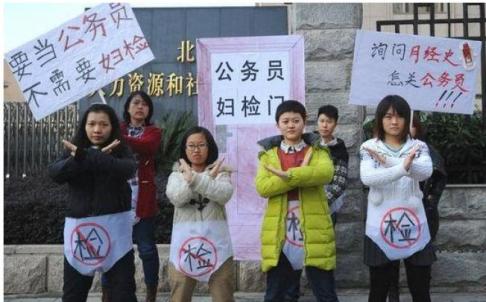in brief: chinese women protest inequality, invasive tests

How often do you get to read ‘Questions about my menstrual periods have nothing to do with my qualification’ on a picket sign?
Since 2005, women in China have been required to undergo gynaecological tests for sexually transmitted diseases and malignant tumours in the name of applying for civil service jobs. They’ve also had to provide information on their menstrual cycles.
Ten women recently defied the government’s hard-line stance on protests and gathered outside a government office to protest the procedures. They carried placards (e.g. ‘Say yes to government jobs; say no to gynaecology tests’ and the above mentioned statement re: menstruation and qualification) and wore mock underwear displaying the Chinese character for “examine” sliced with a red line. ‘Through this demonstration, we call on government departments to drop the examinations,’ an organiser told the Legal Daily, a state-run newspaper.
The protests follow a letter protesting the procedures sent to government agencies by Yirenping Center, a Beijing-based non-profit social justice group. They’ve not heard back.
‘Gender discrimination is very widespread and in many senses institutionalised in China,’ Geoff Crothall, communications director for the Hong Kong-based China Labour Bulletin, told The Guardian. ‘What’s been increasing in the past few years is the number of women in social and civil society activism groups who are standing up and demanding change.’
Since August, about 20 women across China have shaved their heads to protest discriminatory college admission standards. Some universities demand higher scores on exams from women applicants, claiming that doing so balances enrolment ratios. The education ministry approves, ‘in view of considerations of national interest’. This is despite Chinese law (officially) forbidding gender discrimination.
Winter saw protests in the city of Guangzhou as women “occupied” men’s toilet stalls to highlight a lack of women’s toilets. Guangzhou pledged to balance the toilet ratio, but similar protests in Beijing achieved no such effect (they were suppressed). Occupy Wall Street may want to take notes.
As China grows, these moments small as they are now will become increasingly important. Opportunity will only become more scarce and contested: a level playing field is vital and, currently, an unenforced, seemingly hypothetical law.
By Cory Zanoni
Here at Lip, we value insight, debate and shared experiences. That said, we don’t publish content that is discriminatory, derogatory or spam. Please respect that our readers come from different backgrounds, experiences and viewpoints – keep this in mind when posting comments on our site. You can read our full comment guidelines here.

